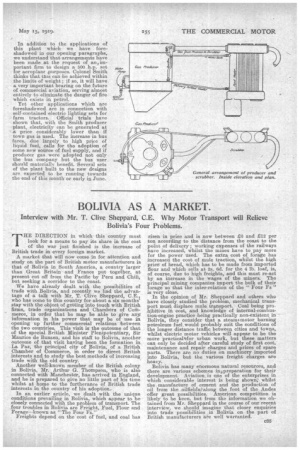BOLIVIA AS A MARKET.
Page 13

If you've noticed an error in this article please click here to report it so we can fix it.
interview with Mr. T. Clive Sheppard, C.E. Why Motor Transport will Relieve Bolivia's Four Problems.
T
. HE DIRECTION in which this country must look for a means to pay its share in the cost of the war just finished is the increase of British trade in every foreign market.
A market that will now come in for attention and study on the part of British motor manufacturers is that of Bolivia in South America, a country larger than Great Britain and France put together, at present cut off from the Pacific by Peru and Chili, but seeking a corridor to the coast.
We have already dealt with the possibilities of trade with Bolivia, and recently we had the advantage of a talk with Mr. T. Clive Sheppard, C.E., who has come to this country for about a six months' stay with the object of getting into touch with British firms, trade organizations and Chambers of Commerce, in order that ho may be able to give any information in his power that may be of use in opening up further commercial relations between the two countries. This visit is the outcome of that of the special British Minister Plenipotentiary, Sir Maurice de Bunsen, and his staff to Bolivia, another outcome of that visit having been the formation in La Paz, the principal city of Bolivia, of a British Chamber of Commerce, in order to direct British interests and to study the best methods of increasing trade with the old country. ' Another well-known member of the British colony in Bolivia, Mr. Arthur G. Thompson, who is also connected with Manchester, has arrived in England, and he is prepared to give no little part of his time whilst at home to the furtherance of British trade interests in the country of his adoption..
In an earlier article, we dealt with the unique conditions prevailing in Bolivia, which appear to be closely connected with the problem of transport. The four troubles in Bolivia are Freight, Fuel, Flour and Forage—known as "The Four Fs," , Freights depend on the cost of iueI, and coal has risen in price and is now between 20 and per
ton according to the distance from the coast to the point of delivery; working expenses of the railways -have increased, whilst the mines have to pay more for the power used. The extra cost of forage has increased the cost of mule traction, whilst the high price of bread, which has to be made from imported flour and which sells at 2s. 6th for the 4 lb. loaf, is, of course, due to high freights, and this must re-act by an increase in the wages of the miners. The principal mining companies import the bulk of their forage so that the inter-relation of the "Four Fs" is very close.
In the opinion of Mr. Sheppard and others who have closely studied the problem, mechanical transport must displace mule transport. Coal being prohibitive in cost, and knowledge of internal-combustion-engine practice being practically non-existent in Bolivia, they consider that a steamamotor burning petroleum fuel, would probably suit the conditions of the longer distance traffic between cities and towns, whilst electric motor vehicles will appear to be the more practicaPefor urban work, but these matters can only be decided after careful study of first cost, maintenance and repair charges and prices of spare parts. There are no duties on machinery imported into Bolivia, but the various freight charges are heavy.
Bolivia has many enormous natural resources, and there are various schemes inoreparation for their development. Aviation, is one of the enterprises in which considerable interest is being shown, whilst the: manufacture of cement and the production of oil from the ofifieldsalong the foot of the Andes offer great possibilities.American competition is likely to be keen, but from the information we obtained from Mr. Sheppard in the course of our recent interview, we should imagine that closer enquiries into trade possibilities in Bolivia on the part of British manufacturers are well warranted.






















